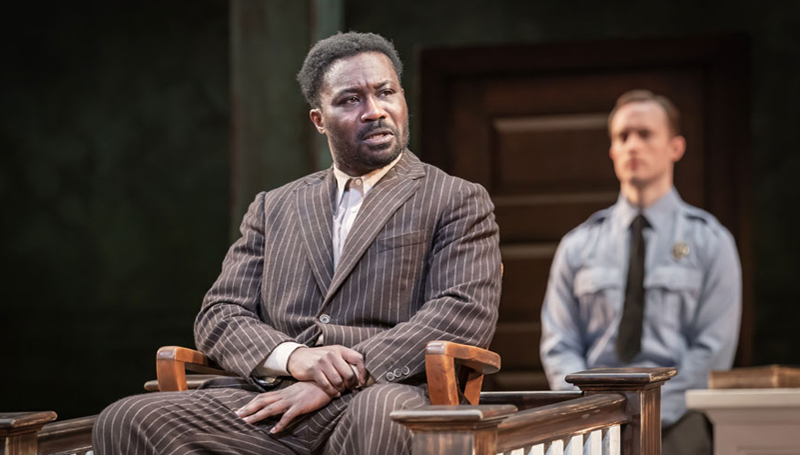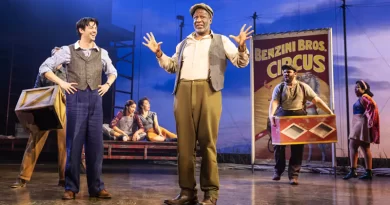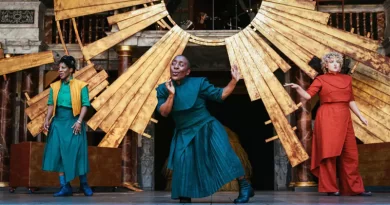“To Kill a Mockingbird”: Gielgud Theatre
Neil Dowden in the West End
11 April 2022
Harper Lee’s classic 1960 novel To Kill a Mockingbird has been successfully staged a number of times over the years (as well as being made into an Oscar-winning film starring Gregory Peck in 1962). But the most recent adaptation by Aaron Sorkin directed by Bartlett Sher became the highest grossing American play in Broadway history after it opened in 2018. Now this production, re-cast with a British ensemble led by Rafe Spall, has finally arrived in the West End two years after it was due to premiere before Covid struck. The wait has been well worthwhile. It’s a big, crowd-pleasing show expertly put together that in turn shocks, moves, and amuses throughout its almost three hours’ running time.
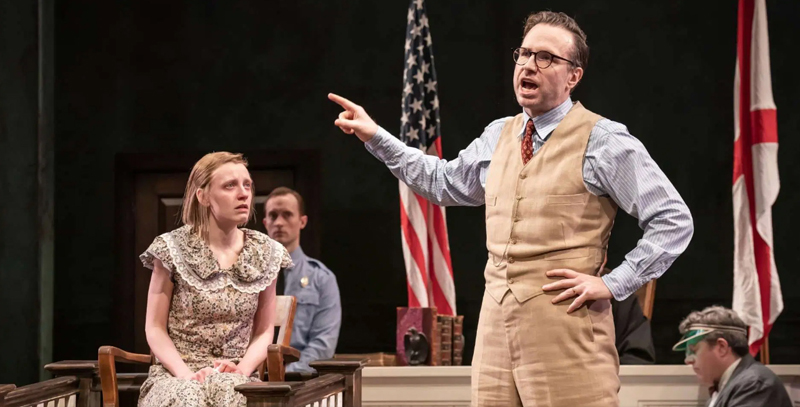
Poppy Lee Friar and Rafe Spall. Photo credit: Marc Brenner.
Set in the 1930s in the fictional small town of Maycomb, Alabama (based on Lee’s own hometown Monroeville), To Kill a Mockingbird mixes rite of passage with social commentary as childhood innocence is confronted by the worst kinds of adult racial and sexual abuse. The novel is narrated by six-year-old girl “Scout” whose widowed father Atticus Finch is a lawyer defending the African American Tom Robinson wrongly accused of raping a white woman – not just in court but from a lynch mob. Sorkin has made some significant changes to reflect a more contemporary sensibility while staying faithful to the original story. He has also split the narration between Scout, her older brother Jem, and their friend Dill – with the children played by adult actors, which works well dramatically as it seems they are relating past events and sometimes their recollections clash comically.
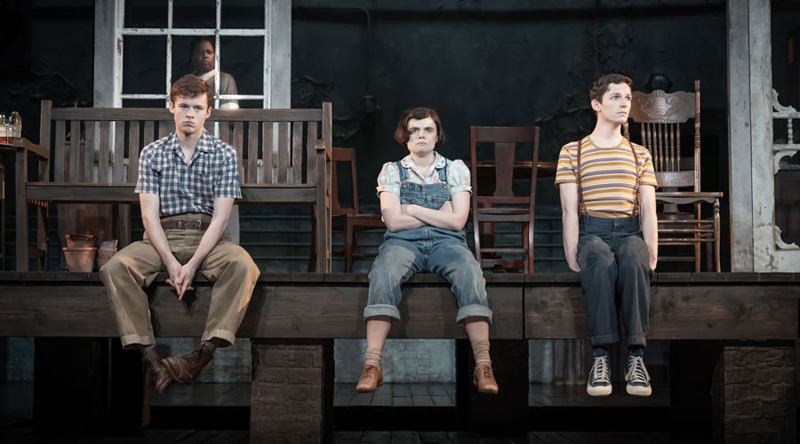
Anti-clockwise: Pamela Nomvete, Harry Redding, David Moorst, Gwyneth Keyworth.
Photo credit: Marc Brenner.
Sorkin has also put more direct focus on Atticus (who is modelled on Lee’s father). He is still very much a force for good if fallible, but Sorkin avoids presenting him as a white saviour, making him less heroic and more human. This is partly done by showing him have his own doubts, while contrasting his liberal “meekness” with the children’s straightforwardly passionate denouncement of evil; but especially by the barbed comments of the family’s loyal but exasperated black housekeeper Calpurnia who satirizes his favourite phrase about the need to understand those with different views by “climbing in his skin and walking around in it” as moral equivocation towards racists. (In fact, the Harper Lee estate delayed the opening of the Broadway show by suing the producers because they thought too much had been changed, especially Atticus’s character, but the dispute was settled amicably before it came to court.)
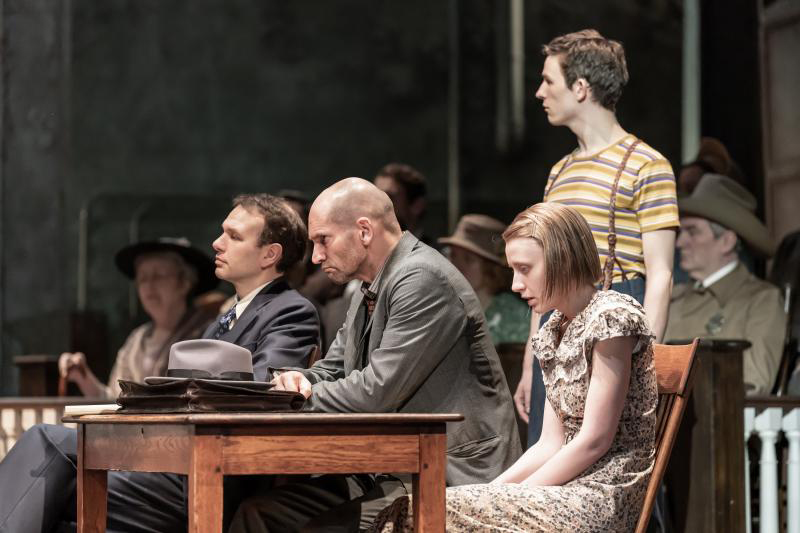
Principals and the ensemble. Photo credit: Marc Brenner.
Not surprisingly, since Sorkin’s best-known play A Few Good Men (also filmed) is a courtroom drama, the rape trial is electric with tension. Unlike in the book, here it is spread out in scenes throughout the performance rather than as a climactic ending, but the various disturbing revelations and horribly unjust verdict still exert a real emotional power. Of course, as the writer of screen dramas like The West Wing, The Social Network, and most recently Being the Ricardos, Sorkin is known for his witty, linguistically dense scripts, and the dialogue in this version of To Kill a Mockingbird carries more zing than usual. He does not pull any punches, and the “N-word” is heard quite a bit as indeed it would have been in such an overtly white supremacist community of that time.
Sher brilliantly marshals the large cast in an engaging production that wears its heart on its sleeve without straying too far into sentimentality. Perhaps the most touching moment is when the lynch mob outside the jail is narrowly stopped from attacking Atticus and murdering Tom by the arrival of the children: when Scout recognizes the voice of one of the hooded Klansmen as belonging to the father of a school friend, this somehow brings a sense of shame to the attackers and they disperse. The show features live music and moves seamlessly between scenes. Miriam Buether’s flexible design mainly alternates between the front porch of the Finch family home and the courthouse whose various elements disappear with impressive swiftness when not in use.
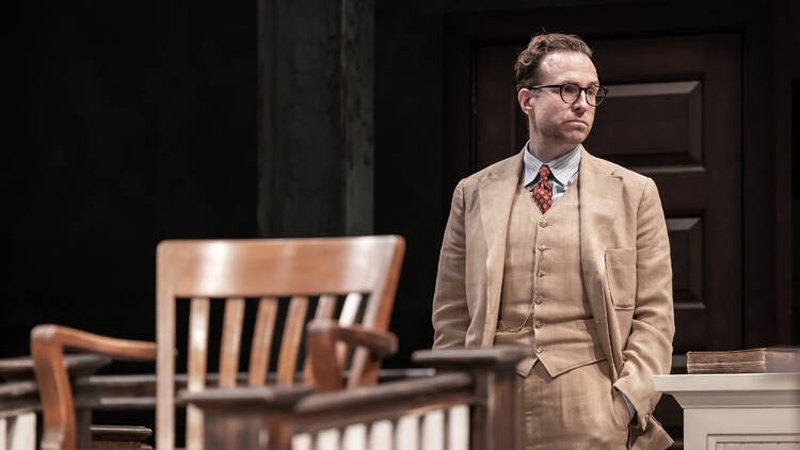
Rafe Spall as Atticus. Photo credit: Marc Brenner.
As Atticus, Spall (replacing Rhys Ifans, originally slated to play the part in 2020) gives a superb performance: he wears the character’s paternalistic virtue lightly (like his off-white linen suit) in an elegant, understated portrayal that makes him approachable rather than venerable. Although coolly rational most of the time as a believer in people’s fundamental decency as well as the efficacy of the judicial system, he also shows frustration and anger when they fail – indeed at the end he tacitly agrees not to report a justified killing.
Gwyneth Keyworth is likeably naive as the plucky, tomboyish Scout (a self-portrait by Lee), Harry Redding is the staunchly protective Jem, and the scene-stealing David Moorst is the amusingly verbose, flamboyant Dill (based on the young Truman Capote): all three successfully convey childlike qualities. Jude Owusu exudes great dignity as Tom whose honesty and natural compassion work against him with terrible irony. Poppy Lee Friar is fully convincing as the desperately devious Mayella Ewell who wrongly accuses him of sexual assault, while being truly a victim of her father Bob, played with malevolent intensity by Patrick O’Kane. And the impressive Pamela Nomvete in the expanded role of Calpurnia receives a very positive audience response with her no-nonsense truth-telling about what’s really going down in the Deep South.

